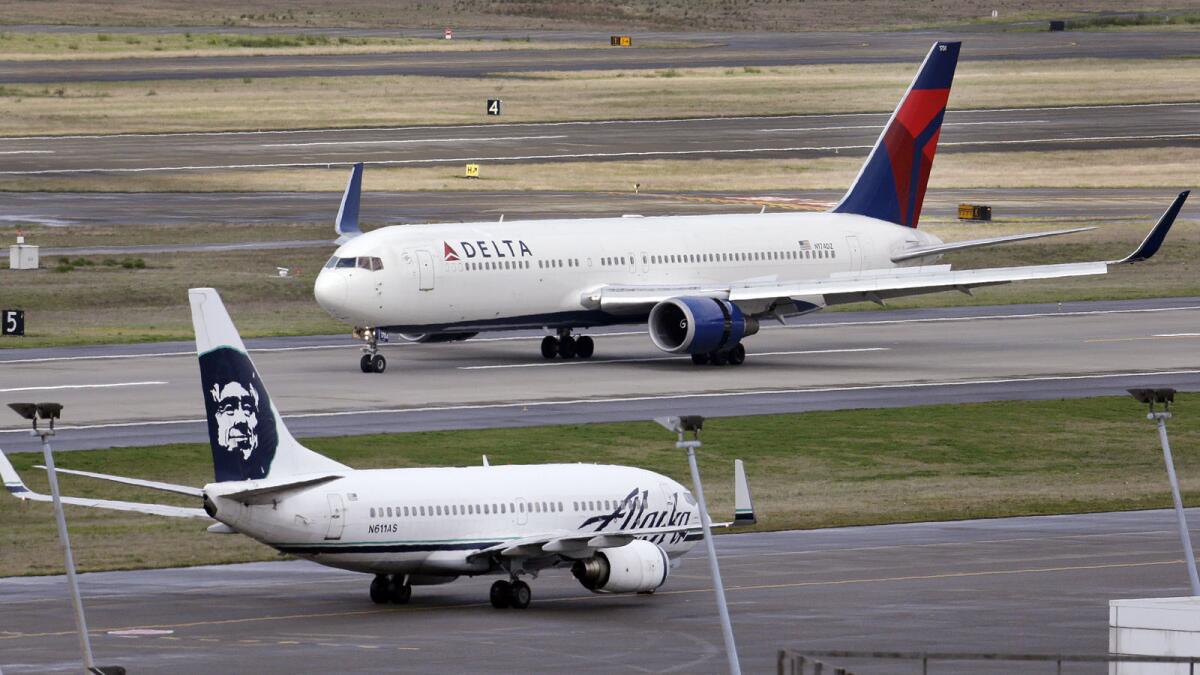Delta Air Lines vows to become carbon neutral by the end of the decade

- Share via
Delta Air Lines announced an ambitious plan Friday to invest at least $1 billion over the next decade to become carbon neutral, a move that comes as the air-travel industry faces pressure from the public and investors to become more environmentally friendly.
Chief Executive Ed Bastian said in a news release that the initiative will start March 1, and will focus on harnessing clean flight technologies and carbon-emission reduction, among other things. Those efforts include upgrading Delta’s aircraft fleet to newer, more fuel-efficient models and using biofuel.
Delta will also continue to invest in carbon-offset programs — rebuilding forestry and other natural habitats that may be damaged from jet-engine emissions — but hopefully on a more limited basis, according to the release.
“There’s no challenge we face that is in greater need of innovation than environmental sustainability, and we know there is no single solution,” Bastian said in the statement. “We are digging deep into the issues, examining every corner of our business, engaging experts, building coalitions, fostering partnerships and driving innovation.”
The aviation industry accounts for about 2% of the word’s carbon-dioxide emissions, according to a study from the International Council on Clean Transportation. Global airline travel consistently grows by about 5% a year, according to the International Air Transport Assn., a trade group. But that growth rate dropped to 4% in 2019, the organization said.
Some airlines fret U.S. travelers will avoid flying to help fight climate change. Carriers are touting their green ways, but environmentalists cry ‘greenwashing.’
Public and investor pressure is compelling airlines to think more critically about their environmental footprint.
Greta Thunberg, a teenage climate activist from Sweden, has led a charge to use other means of transportation, and pioneered the term “flygskam,” or flight shame. The movement has been credited with a recent 4% drop in the number of commercial passengers flying in Sweden.
Investors also are pushing big banks and investment funds to go green. Some of the largest funds that specialize in environmental, social and corporate governance issues (ESG funds) outperformed the overall stock market last year. Goldman-Sachs in December became the first prominent U.S. bank to say it would stop backing coal investments and would restrict oil and gas investments. BlackRock, the world’s largest asset manager with nearly $7 trillion assets under management, announced last month it will avoid investments with companies that “present a high sustainability related risk,” such as coal producers.
Henry Harteveldt, a travel industry analyst with the Atmosphere Research Group, said industry leaders have told him they hear from concerned customers — and their own children — about the environmental footprint of aircraft.
It’s up to Delta to deliver, Harteveldt said. “It’s a great press release, but what the world is going to look at and what the world will measure is not the press release, but the actual commitment,” he said. “But it’s good to see an airline, especially a large global airline, make a statement like this and start to take action.”
Harteveldt said he has no reason to believe Delta won’t achieve its objective, but there’s value in setting the goal as well. “I will also say that in business you need to put big, audacious goals out there to strive to achieve and do your best to meet those commitments,” he said.
Advances that would reduce carbon emissions for air travel have proved challenging. Smaller companies have experimented with battery-powered and hybrid-electric powered airplanes. A two-seat Airbus plane flew across the English Channel in 2015, and Irvine charter jet operator JetSuite expects to add hybrid 12-seat planes to its fleet by 2022. But batteries aren’t a feasible option for large planes yet. Generating the amount of energy needed to power a large aircraft would require batteries that would add significant weight to the aircraft.
Last October, Delta invested $2 million to partner with Northwest Advanced Biofuels for a study of a biofuel production facility. Biofuel can reduce approximately 70% of the greenhouse gas emissions generated by petroleum-based fuel, according to Bryan Sherbacow, chief commercial officer at World Energy, a leading biofuel company that has a facility in Paramount. Its costs are “a slight premium” over those of fossil fuel, he said, declining to put a specific number on it. World Energy makes its fuel from non-edible agricultural material, mainly fats, oils, greases and wastes.
Sherbacow said World Energy works with or has fielded inquiries from companies such as United Airlines and Boeing. He applauded Delta’s aggressive approach, though he thinks the airline could push harder to adopt products like his.
“It looks like they’re seeking to make investments in technologies that might remove carbon from the atmosphere. So they’re not addressing the underlying issue of low-carbon transportation fuels. They’re looking to find technologies that mitigate it or offset it,” Sherbacow said.
More to Read
Inside the business of entertainment
The Wide Shot brings you news, analysis and insights on everything from streaming wars to production — and what it all means for the future.
You may occasionally receive promotional content from the Los Angeles Times.












